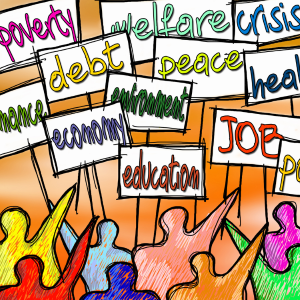Social Welfare Law - What is it?

A blog post by Gary Steel
I graduated from the OU with a Bachelor of Laws (Hons) in 2014 knowing I wanted to work in law, however, I did not know which tier of the profession, or in what area. I knew I wanted to litigate, so that narrowed my options down. I worked in Family Law and Immigration Law before finding my place in Social Welfare Law at Derbyshire Law Centre.
What is Social Welfare Law?
Social Welfare Law is an umbrella term for a number of areas of law such as: Housing, Debt, Welfare Benefits, Employment, Discrimination, Immigration etc. Usually, legal aid is available but not always, as with Employment Law and where legal aid is not available, the organisation (who are usually a charity or not for profit, like Derbyshire Law Centre) will use grants and donations to fund projects.
Usually, Social Welfare Law is practised by not for profit organisations such as Law Centres, Citizens Advice and other third sector organisations. It impacts and effects the most disadvantaged in our society who cannot afford access to justice. Legal Aid has been drastically reduced, and with this access to justice has been restricted because people simply cannot afford to seek justice. At the end of the day the law is a business and it does not make financial sense for high street firms to practise areas of law that do not bring in the money. It is a sad fact!
Many of the areas of law that come under the umbrella are not specifically taught on the LLB or LPC. For example, Housing Law, only a few institutions offer this as an option, instead you will study Land Law and Property Law which will touch upon Housing Law. I did not know anything about Housing Law until I started to work as a Housing Paralegal at Derbyshire Law Centre.
I decided to practise Social Welfare Law because it gave me an opportunity to really help those who need it the most. I really do, every day, give the mute a voice and ensure access to justice is afforded to everyone despite their financial means – as cliché as that sounds.
What is it like as a Social Welfare Solicitor?
In short it is brilliant, I work with dedicated, expert and compassionate people who care about access to justice, to help make sure the law and legal advice is afforded to all – not just those who can afford it! I work in some very complicated and niche areas of law and I can see my work making a difference everyday.
No two days are the same. I can be representing a client in the County Court in eviction proceedings one day and drafting particulars of claim in an Unfair Dismissal claim the next. Also, no two clients are the same. It is rare that a client will come to see me or one of my colleagues with just one issue. Usually a client will travel around my organisation and be helped with lots of issues and it is this holistic approach that I like. Someone may come for help with an eviction matter, but will also present with debts or an employment issue and we can help with it all, rather than multiple separate organisations becoming involved and adding to the client’s stress.
How can you become involved in Social Welfare Law?
The easiest way is to contact your local Law Centre or the Law Centres Network and look for volunteering opportunities. You could also volunteer at your local Citizens Advice. The Legal Education Foundation is dedicated to ensure that there is are next generations of Social Welfare Legal Aid lawyers through their Justice First Fellowship so if you are interested in social welfare law you should have a look at the fellowship.

Gary Steel
Gary Steel is a Solicitor at Derbyshire Law Centre. He graduated from the Open University in 2014 with a Bachelor of Law (Hons).
Gary successfully won the prestigious Law Society Diversity Access Scheme scholarship to study the LLM LPC. In 2020, Gary was made a The Legal Education Foundation, Justice First Fellow. He commenced his Training Contract at Derbyshire Law Centre and qualified into the Employment and Discrimination Unit.